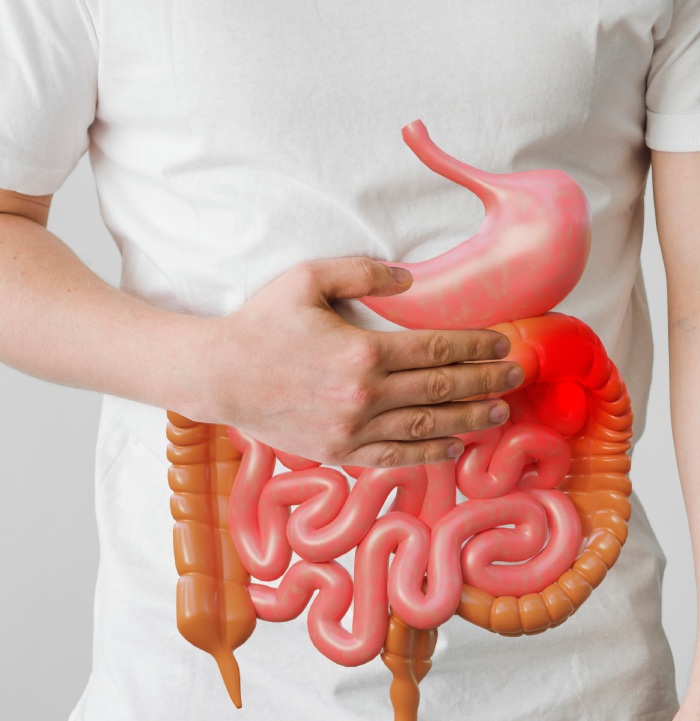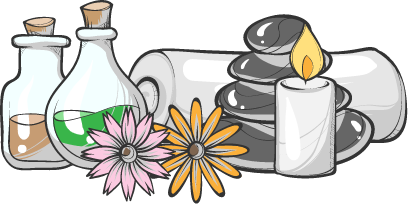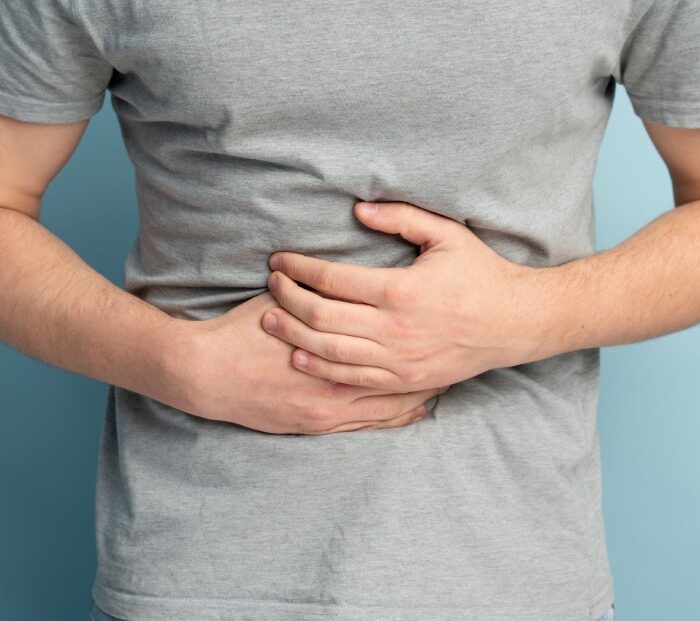AYURVEDIC TREATMENTS FOR ULCERATIVE COLITIS
IN SANJEEVANAM, KERALA
Ayurvedic way of treatment for Ulcerative colitis is by restoring the balance of Vata dosha and Pitta dosha in the body since an imbalance of these doshas in the body causes a worsening of the ailment. These treatments consist of boosting Pachaka Pitta through the use of herbs and dietary modifications, purging the AMA from the body through Panchakarma therapy, purifying the blood, regulating the bowels and treating ulcers with various natural herbal preparations.
At Sanjeevanam, we’re taking an integrative approach to treating ulcerative colitis. Through methodically designed Panchakarma-based purificatory procedures and also with efficient newly made internal drugs, ayurvedic treatments primarily seek to stabilise the vitiated doshas. Following the purification, Vata-friendly therapies and medications are given in order to boost immunity and produce a long-lasting outcome. With the help of the best Ayurvedic practices to manage Ulcerative colitis, it is possible to strengthen both the mind and the body through the combination of a personalized diet, pranayama, meditation, and physical routines.

WHAT IS ULCERATIVE COLITIS?
Ulcerative Colitis is a disease in which the inner lining of the large intestine is overheated and or becomes damaged due to various reasons. This may start as a small ulcer or inflammation at any part of the colon and then slowly progress to the entire colon. This can be described as a challenge of this era.
Ayurvedic texts describe a group of diseases called Atisara (dysentery). The symptoms of ulcerative colitis described in modern science are closely related to some of the symptoms of Atisara (dysentery) subtypes described in Ayurvedic texts. Ulcerative colitis, according to Ayurveda, is associated with the illness Pravahika and typically presents as Atipravahana of Purisha (more number and quantity of defecation), Atidrava Purisha Pravritti (watery stool), Udarashoola (with abdominal pain and cramps), Picchila (sticky stool), Saphena (frothy stool), and Raktayukta Purisha (blood-mixed stool).

SIGNS & SYMPTOMS OF ULCERATIVE COLITIS
* The major Signs and symptoms of Ulcerative colitis are, Diarrhea often with blood or pus, Bleeding per rectum (small amount of blood passing with stool), Abdominal cramps and sometimes pain, Pain in the anal canal, Urgency in defecation, even though there is urgency the defecation may take time, Loss of body weight, Fatigue, Occasional change in body temperature.
* If this disease occurs in children, there will be a loss of appetite and failure in development.
* Depending on the extent of the inflammation and its location of it, the symptoms of ulcerative colitis can change. Mild to severe symptoms characterize the majority of ulcerative colitis patients. The course of ulcerative colitis can vary, and some people experience prolonged remissions.
CAUSES OF ULCERATIVE COLITIS
There is still no established cause for ulcerative colitis. Stress and food habits were previously suggested as causes. According to the studies, these elements may worsen ulcerative colitis but do not actually cause the disease. Immune system dysfunction may be one of the causes. The immune system attacks the cells in the digestive tract when it attempts to combat an infected virus or bacterium due to an abnormal immunological response.
It appears that hereditary factors may also contribute to the higher prevalence of ulcerative colitis in families where the condition has already been diagnosed. However, this familial history is not present in the majority of individuals with ulcerative colitis. When we consider the risk factors, age, race and family history are having major roles. Normally this disease manifests near the age of 30 years. Today, though, kids are also affected by it. Some people with the condition may not have symptoms until they are older than 60. In the race factor, the disease is more likely to affect white people. High-risk factors for developing this condition include family history.
According to Ayurveda, our digestive system, often known as “Agni,” performs a variety of tasks, including nutrient absorption, food particle assimilation, and digestion. The faulty or insufficient digestion of food particles brought on by this agni’s failure frequently results in an accumulation of AMA (undigested food), which the body absorbs and stores. A compromised digestive metabolism results from the stored AMA impact on the release of various digestive juices.
Ayurveda essentially states that constant consumption of unwise food (spicy, greasy, frozen food), incorrect lifestyle (lack or excessive exercise, sleep, etc.), Roga (infections), and Apakarsha Vyadhikshamatva (poor immunity) causes weakening of the Pachak Pitta (digestive fire), resulting to this digestive condition. It is mostly characterized by rectal pain, stomach cramps, weakness, exhaustion, weight loss, bloating, appetite loss, abnormal bowel movement, blood in the stool, diarrhoea, etc.

HOW IS ULCERATIVE COLITIS DIAGNOSED?
Accurate diagnosis of ulcerative colitis involves endoscopic procedures for tissue samples. Additional tests, such as stool and blood tests, help rule out complications and other inflammatory bowel diseases. Blood tests check for anemia, infection, and inflammation, while stool tests assess infection and occult blood.
Common endoscopic techniques include colonoscopy and flexible sigmoidoscopy. Colonoscopy examines the entire colon, collecting biopsy samples, while flexible sigmoidoscopy focuses on the lower end.
Imaging procedures like X-ray, MRI, and CT scans aid in differential diagnosis and assess disease severity. X-rays reveal megacolon or perforation, while CT scans and MRIs offer radiation-free alternatives for enterography, evaluating disease severity.

HOW AYURVEDA CAN TREAT
ULCERATIVE COLITIS
Ayurvedic treatment for ulcerative colitis involves, bringing Vata and Pitta dosha back into balance considering the imbalance of these doshas in the body leads to a worsening of the condition. To do this, first, prepare a bio-cleansing technique, then perform a colon healing Vasthi procedure called Piccha Vasthi to balance the doshas and reduce infection and inflammation. Vasthi also has the advantage of resetting the GUT-brain axis, which helps to control aberrant brain chemical production brought on by stress. By using several herbal remedies and dietary adjustments, eliminating AMA with Panchakarma therapy, purifying the blood, managing the bowels, and treating ulcers. These therapies help to increase Pachaka Pitta as well.

ULCERATIVE COLITIS AND YOGA

One-third of people with Ulcerative colitis are prone to anxiety and depression. There comes the relevance of Yoga.
Yoga is the union of the mind and the body. An appropriate combination of Asana, Pranayama, Relaxation techniques and Meditation plays a vital role to reduce the triggers like stress and symptoms like pain, fatigue etc. Yogic postures and exercises which target the abdomen region will help to relieve the symptoms. For example, the Pawanmuktasana – as the name suggests will help to release the accumulated gas in the Intestine which is the main cause of bloating and abdomen discomfort seen in the majority of people with Ulcerative colitis.
Another smart technique in Yoga which helps to relieve the major trigger stress is the practice of Mind Fullness. It’s actually not a practice – It’s a way of living in the present moment. It will teach us to get rid of our worries and help us to accept the situation as it is. So that a person can live in peace.
And the relaxation techniques like QRT, DRT can be used to relieve gastrointestinal symptoms like bloating, improper peristaltic movements causing diarrhoea, leaking of stools etc.
Even though Ulcerative colitis is a colon inflammation, it requires a holistic approach to treat the condition. Yoga will help in that way, to align the mind and body and will reduce the flare ups and can able to maintain a healthy human body.

FREQUENTLY ASKED
QUESTIONS
Can ayurveda cure ulcerative colitis permanently?
According to Ayurveda, ulcerative colitis is classified as “Pittaja Grahani,” which is a Vata-influenced condition. Perfect health is understood in Ayurveda to exist when the three basic energies (doshas: Vata, Pitta, and Kapha) are in harmony. Out of these three, Pitta dosha imbalance leads to Pittaja Grahani and vitiates the intestines which are in the site of Vata.
Improved immune system regulation is the main objective of treating ulcerative colitis in patients. Although there is currently no proven treatment for ulcerative colitis and flare-ups may recur, a variety of treatment choices and medicines in Ayurveda can help to maintain control of the condition and lead a full and meaningful life.
Since an imbalance of the Vata dosha in the body causes ulcerative colitis to worsen, ayurveda strongly advises that this inflammatory condition can be efficiently treated by reducing or eliminating the pitta dosha and bring back the Vata dosha into balance.
Is ulcerative colitis fatal? What can happen if ulcerative colitis goes untreated?
The digestive system becomes inflamed and develops ulcers as a result of the inflammatory bowel disease (IBD) known as ulcerative colitis. The rectum and colon’s innermost lining are both impacted by ulcerative colitis. In most people, symptoms typically appear gradually rather than abruptly. Draining and perhaps life-threatening consequences are possible with ulcerative colitis. The life expectancy is essentially the same for someone with ulcerative colitis (UC) as it is for someone without it. To prevent issues, including those that could be fatal, it is imperative to receive the appropriate medical care.
The deeper layers of the colon may become inflamed if ulcerative colitis is left untreated, leading to a highly serious complication known as toxic megacolon. The uncontrolled inflammation can alter the colon’s cell structure and that may lead to getting colon cancer. This illness needs to be addressed immediately because it might cause potentially fatal infections, kidney failure, or colon rupture. Surgery is currently the only viable option for medical treatment. The diseased colon may be entirely or partially removed during surgery for toxic megacolon.
What is the difference between ulcerative colitis and crohn's disease?
The colon’s lining becomes inflamed and develops tiny open sores or ulcers as a result of the chronic inflammatory disease ulcerative colitis (UC), which affects the colon. that belongs to inflammatory bowel illness. It irritates, inflames, and expels mucus or faeces stained with blood. The immune system’s excessive activity is the cause of this ailment.
Crohn’s disease is another kind of inflammatory bowel illness (IBD). It results in the tissues of the digestive tract swelling (inflammation), which can cause abdominal pain, severe diarrhoea, exhaustion, weight loss, and malnutrition. Different parts of the gastrointestinal tract can become inflamed as a result of Crohn’s disease, although the small intestine is the most frequently affected area. The deeper layers of the bowel are frequently affected by this inflammation.
The symptoms of Crohn’s disease can occasionally be life-threatening and can be both unpleasant and incapacitating. Although Crohn’s disease has no known cure, medications can greatly reduce its signs and symptoms and even cause long-term remission and inflammatory healing. With medication, many Crohn’s disease sufferers can lead productive lives.
Does ulcerative colitis hurt all the time?
In ulcerative colitis, the colon may become inflamed after beginning in the rectum. Symptoms could be ongoing or intermittent. They include constipation, weight loss, discomfort in the abdomen, anemia, and blood or pus in the bowel motions. The inflammation associated with ulcerative colitis can be controlled with medicine, but there is no known cure. For more complex cases, surgery may be a possibility.
Ulcerative colitis can cause crampy abdominal pain that makes your stomach feel like it’s on fire. It might occur either before or during a bowel movement. You can experience pain in additional body parts. Joint pain occurs in some illness sufferers.
The symptoms of ulcerative colitis are likely to come and go, reoccurring less frequently, and perhaps not at all. These intervals—known as remissions—can last for months or even years. since ulcerative colitis does not currently have a treatment and symptoms will eventually return.
The return of illness symptoms is referred to as a flare-up. Flare-ups can come on suddenly and linger for hours, days, or even weeks in persons with ulcerative colitis (UC), an inflammatory bowel disease (IBD).
Depending on where the inflammation is, pain may be felt in several places, including the abdomen or the rectal area. For instance, if the rectum and the lower part of the colon are both affected by UC, people may feel moderate to severe discomfort on the left side
BOOK APPOINTMENT























